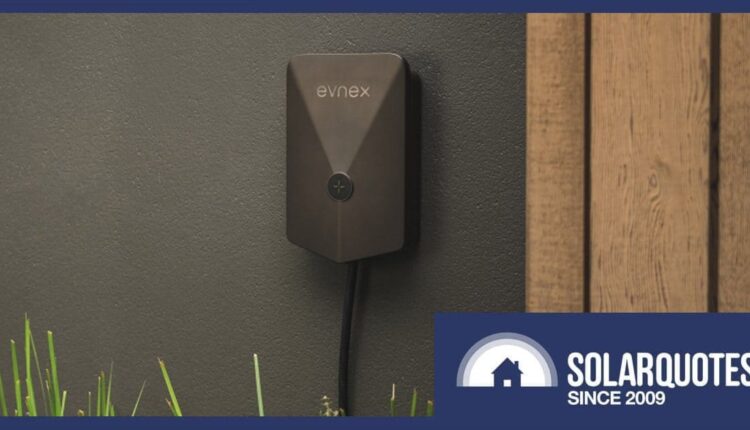Evnex introduces “grid now, solar later” charger for electric vehicles
New Zealand company Evnex has introduced a hard-wired electric vehicle charger for budget-conscious buyers – the E2 Flex. Find out what’s included (and what’s not) and how much it costs.
What are the specifications and cost of the E2 Flex?
- 7.4 kW power, single phase.
- 5 m long tethered charging cable.
- Overload protection for the home.
- Includes power sensor (CT).
- Operating temperature range: -25°C to 55°C.
- Protection class (IP): IP55.
- Dimensions: 288mm x 185mm x 66mm.
- Weight: 4.2kg
- Color: Volcanic (dark gray).
- Mobile app for monitoring and planning.
- Warranty: 4 years.
- Cost: $649.00 before installation (introductory price).
- Shipping begins December 1, 2025.
You will need an electrician to install a hardwired charger like the E2 Flex. This can cost anywhere from a few hundred to a few thousand dollars depending on the complexity of the installation scenario, but most pay $1,000 to $1,500 for installation.
Evnex says it can arrange installation, which works out to about $900 for a standard installation. What is considered “standard,” the company says:
“…as a rough guide this usually means you install the charger within 1 meter of your electrical panel and it is on the ground floor of your home.”
Note that the 5 meter charging cable may not be long enough to reach your electric vehicle and no other option is available if you install the E2 Flex within 1 meter of your electrical panel.
What is missing from the E2 Flex?
A particularly important feature missing from solar panels is support for smart solar charging. The E2 Flex draws power from the grid and additional solar energy if you have a system installed – but it doesn’t have the intelligence to control solar charging.
Without this feature, the E2 Flex might be viewed by some as not being particularly smart. However, support for this can be added later through a software update (no need to visit an electrician again), which costs $399.
“Flexibility is in the name,” said Ed Harvey, CEO of Evnex. “Users can get started easily, and when they later install solar, the upgrade is seamless.”
The E2 Flex also lacks Tesla integration. If you want smart solar charging or Tesla integration (or both) right out of the box, there’s the E2 Plus (Hardware: $1,173.00). The E2 Core ($988.00) also supports solar-only charging, but doesn’t offer Tesla integration.
The E2 Flex also doesn’t have a cable hook or Amber integration.
A shortcoming of all Evnex chargers is related to the Open Charge Point Protocol (OCPP), which facilitates communication with other OCPP devices and integration with third-party services. While Evnex chargers use OCCP, they do not allow OCPP connections to be pointed to another software platform. Given the growing number of third-party services using OCCP, compatibility could also be considered a must for some EV owners.
Use solar sharers
A few weeks ago, Australia’s Federal Minister for Climate Change and Energy Chris Bowen announced that electricity retailers in several states will initially be required to provide a time-of-use (ToU) electricity tariff that provides households with at least three hours of free electricity in the middle of the day.
The Solar Sharer initiative *should* be implemented in New South Wales, southeast Queensland and South Australia from July next year; with the aim of expanding it across Australia in 2027.
“With its higher power output, the E2 Flex helps electric vehicle drivers take full advantage of these benefits – enabling more charging than standard chargers in these free hours,” explains Evnex. “Combined with intelligent scheduling, the E2 Flex smart charger ensures that charging coincides with the Solar Sharer’s free electricity hours, even without a rooftop solar system.”
The Evnex E2 Flex’s maximum power of 7.4 kW provides up to 4 times the charging speed of some standard plug-in devices, also known as trickle, granny or brick chargers.
It’s worth noting that some electricity retailers already offer “free hour” plans. An example is AGL’s ‘Three For Free’ electricity plan, which we looked at a while ago, which has higher consumption and higher daily charges than its ‘Smart Saver’ plan. Also note that the details and terms of Solar Sharer are far from finalized.
Evnex was founded in 2014 and the factory is located in Christchurch, New Zealand. You can find out more about the company’s products and what Australian customers think of them on our Evnex electric vehicle charger reviews page.
So which device from which company is best for charging your electric vehicle at home in your circumstances? Learn everything to look out for and recommendations in SolarQuotes’ guide to residential electric vehicle chargers. And if you’re looking for quality electric car charger installation services, we can help you with that too.



Comments are closed.